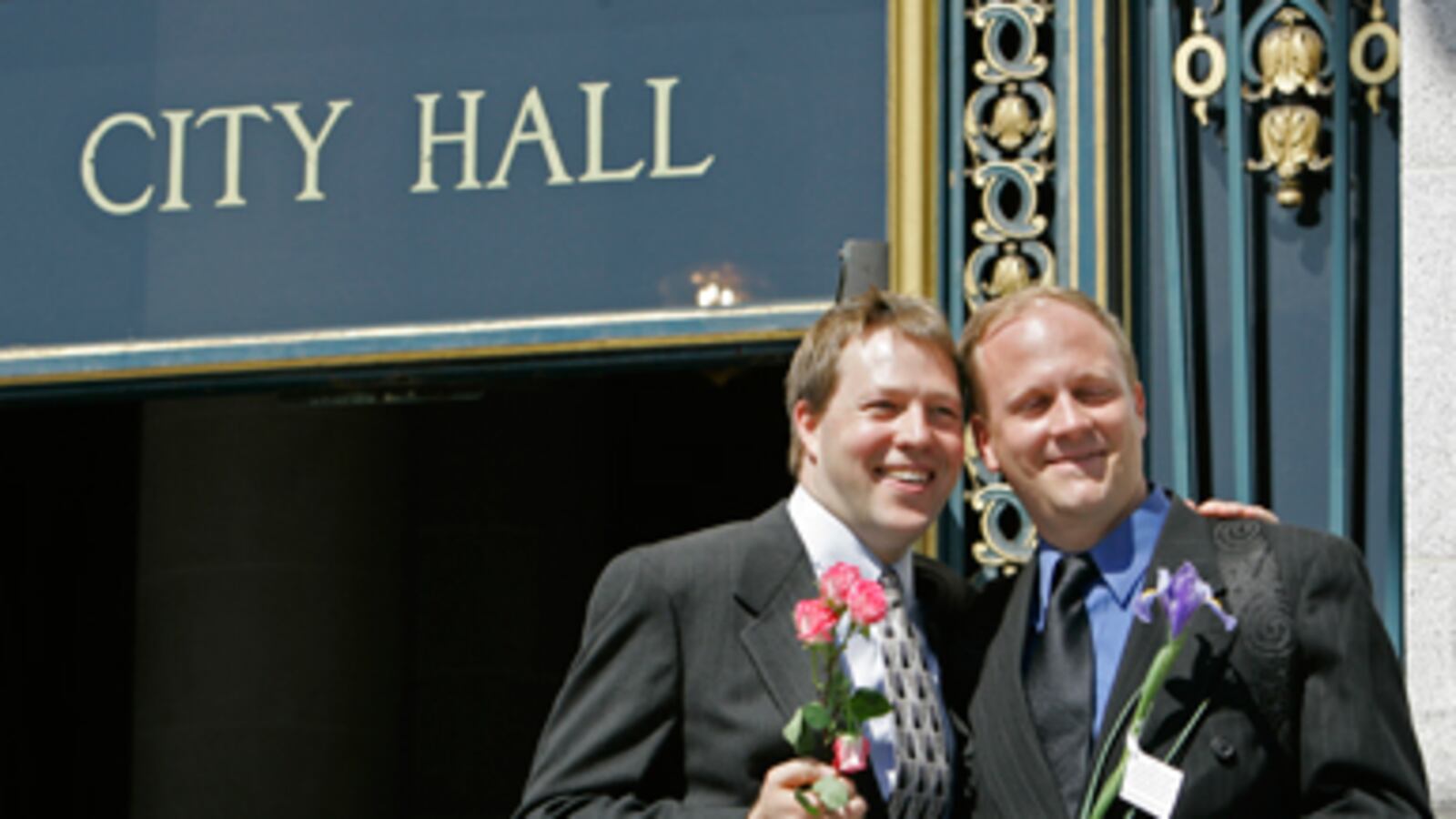They cupped each other's hands and shifted their body weight ever-so-slightly. I had practiced the line a dozen times, but I couldn't believe what I was about to say: "By the power vested in me through the state of Massachusetts, I now pronounce you… married!" The room exploded with a cacophony of applause and clinking Champagne flutes. It was 2009, and I had just officiated the wedding of two of my gay friends.

But something felt off.
For a brief moment, as I stared out at this joyous crowd comprised of the brides' family members and friends, I had the sensation that I was at a rally—because it wasn't just a marriage that was happening here. It was a gay marriage. It was something ground-breaking, something to be celebrated, for sure. But as proud as I was to have played some part in these two women's legal union, I couldn't help but wonder, could I ever go through with this myself?
Last week, President Obama declared the Defense of Marriage Act unconstitutional and instructed the Department of Justice to stop enforcing it. It was a moment to exalt—the second such gay-rights milestone in only two months, coming on the heels of landmark legislation to repeal the military's "Don't Ask Don't Tell" policy. But lost in the euphoria was an awkward truth that gay people don't like to talk about: Gay marriage feels weird. In fact, many of us, myself included, don't feel very comfortable with it at all.
A few years ago, before California, before Iowa, when in early 2004 Massachusetts was all set to blaze this improbable trail, I had gay and straight friends congratulating me left and right. They all wanted to know how excited I was about the news. I could only shrug and reply, "That's great, but I don't think marriage is for me." People reacted to my ambivalence as if I had just burned an American flag. How could I turn my back on the centerpiece of the modern gay-rights movement? My personal relationship choice had suddenly become a political stand.
But it's not just me. For all the effort we've put into fighting for the right to do it, the dirty little secret is that many gays are simply not sure about same-sex marriage. Of course we believe in equality. But when it comes to marriage, our personal relationship with the idea is tenuous. Growing up in a society where most of the marriages around me failed bitterly or were one of multiple (because the only thing better than one "special day" is five), I'm turned off by the whole idea.
Dan Dinero, a PhD-candidate from New York City, has a partner who is a non-U.S. citizen. "The main thing for me is finding a way for Diego to live in the U.S. with me," he says. "I don't think we should have to get married to do that. And that is the problem with gay marriage: it forces queers to fit into a very straight-centered way of life in order to access basic rights."
The religious implications of marriage are one of the deterring issues for Meredith Cummings, a graduate student in environmental studies who has been in a domestic partnership for two years. "It really gets to me when gay couples try to have a traditional wedding, especially in a religion that doesn't support homosexuality," she says.
There's the unsettling possibility that we've spent the past couple of decades fighting to fit into an institution that doesn't necessarily fit us.
But there's a subtler, even more insidious anxiety lurking beneath the surface of our gay-marriage win. It's the unsettling possibility that we've spent the past couple of decades fighting to fit into an institution that doesn't necessarily fit us. I wouldn't be surprised to see someone wince if I referred to my partner as my wife. And I might wince a bit myself. We've been so focused on getting marriage "equality" that we've hardly stopped to think about how we'd feel about actually being married.
I don't bring up these concerns very often. Questioning the idea of gay marriage makes people think your goal is to subvert the whole gay-rights agenda—we need numbers, to be unified on this matter as our top concern. For gays to talk about not wanting to get married is taboo. By expressing my doubts, I am clearly a dissenter in this persistent force for progress. But getting married, gay or otherwise, doesn't seem like progress to me.
It seems like conformity, and a way to tame and appease the gay community so we'll go gently into that good night. Don't get me wrong, I am grateful to those who stand up for equality, whether on a senate floor, in a court house, or on a school playground, and I hope that all couples, regardless of gender, have the option to marry if they truly wish. But in terms of what is important for me as an individual, do I want gay marriage to be the be-all end-all? I don't.
Natalie Neusch is the Assistant Managing Editor at Popular Mechanics magazine and a freelance writer. She previously worked as a copy editor and writer for Martha Stewart's Everyday Food.






